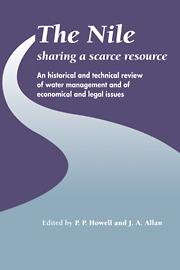 The Nile: Sharing a Scarce Resource
The Nile: Sharing a Scarce Resource Book contents
- Frontmatter
- Contents
- Preface
- List of Contributors
- Orthography
- Units and Conversion Factors
- Introduction
- I Environmental history of the Nile and its management
- II Nile management and factors affecting future management
- III Future utilisation of Nile waters
- IV Economic, international and legal issues
- Index
Introduction
Published online by Cambridge University Press: 05 February 2012
- Frontmatter
- Contents
- Preface
- List of Contributors
- Orthography
- Units and Conversion Factors
- Introduction
- I Environmental history of the Nile and its management
- II Nile management and factors affecting future management
- III Future utilisation of Nile waters
- IV Economic, international and legal issues
- Index
Summary
Principles of ‘sustainability’ have been advocated very insistently during the past decade but they had been eloquently and powerfully enunciated many centuries ago in a saying which in its first part captures with extraordinary simplicity the notion of sustainability and in the second prescribes a moral code which would encourage the principled behaviour necessary for the implementation of sound management of renewable natural resources.
‘Cultivate your world as if you would live for ever, and prepare for your Hereafter as if you would die tomorrow’
Saying of the Prophet Mohammed, explained by 'Ali Mubarak,
(May 1891)The Nile: an important international resource under pressure
The Nile drains approximately ten per cent of the continent of Africa and includes all or parts of the territories of nine sovereign nation states. The allocation of its waters and the management of them between the competing national and using interests are inevitably complicated and tend to be highly charged with respect to water rights, and the resulting tensions are likely to become of greater significance in future. The present international relations and the pattern of water resource allocation and management are determined partly by the status, that is the volume and quality, of the water resource, and partly by the predictable attitudes of governments and peoples to an annually varying resource, the ownership of which is not clear.
- Type
- Chapter
- Information
- The Nile: Sharing a Scarce ResourceA Historical and Technical Review of Water Management and of Economical and Legal Issues, pp. 1 - 14Publisher: Cambridge University PressPrint publication year: 1994
